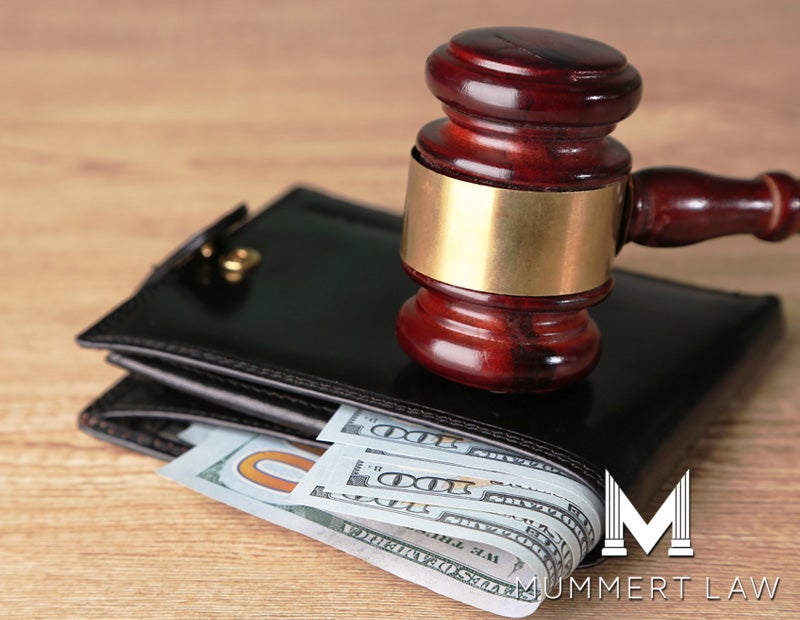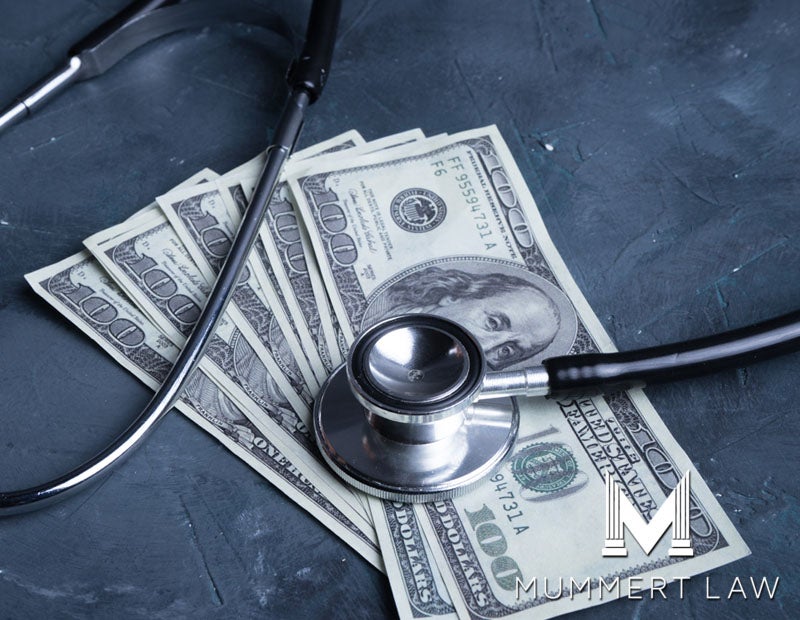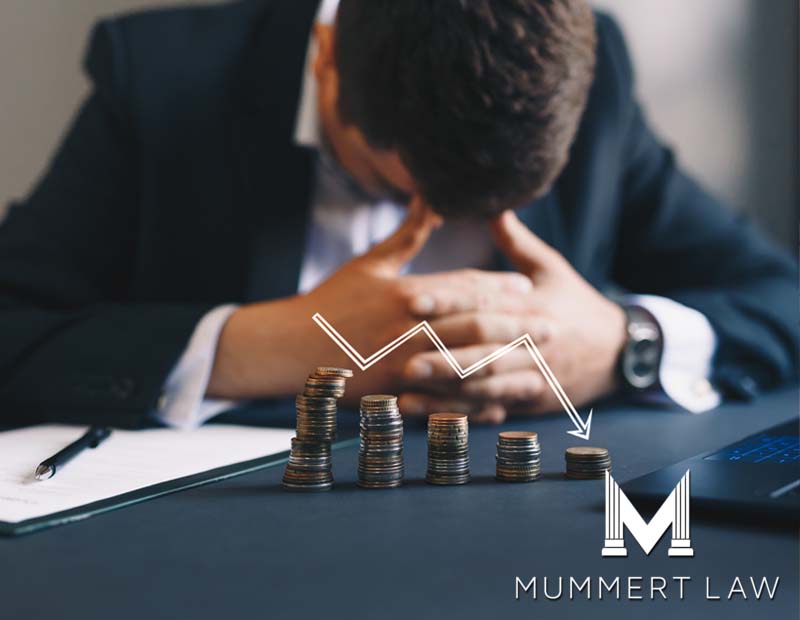-
Bankruptcy And Wage Garnishment
 Financial situations are unique, complicated, and can be overwhelming. Sometimes, if your debts go unpaid long enough, a creditor can garnish your wages. But what is wage garnishment? And can you still file for bankruptcy after your wages have been garnished?
Financial situations are unique, complicated, and can be overwhelming. Sometimes, if your debts go unpaid long enough, a creditor can garnish your wages. But what is wage garnishment? And can you still file for bankruptcy after your wages have been garnished?The short answer is that many people file Chapter 7 and Chapter 13 Bankruptcy to either stop or prevent a wage garnishment.
Wage Garnishment Defined
A creditor can sue you over unpaid debt. Typically, they’d need to obtain a money judgment against you, which is a court-issued document stating the creditor won the lawsuit. A money judgment is entered if you don’t respond to the initial suit, which is known as a default judgment, or after a trial and the Court rules in favor of the creditor. In Maryland, you have 10 days to pay the judgment. If you don’t pay the judgment, many creditors will then garnish 25% of your income from your wages, as well as attach your bank account or put a lien against your property.
Wage garnishment is when a creditor files a request to have your employer withhold or deduct part of your wages to begin paying back your debt. The types of debt that a creditor can collect through wage garnishment include:
- Credit card debt
- Personal loans
- Taxes
- Medical bills
Note – While you are allowed to oppose the garnishment, generally speaking, there is no defense in State Court of I cannot afford the garnishment. Also, this wage garnishment is not the same as attachment of your wages for unpaid child support or alimony.
Bankruptcy and Wage Garnishment
Filing for Chapter 7 or 13 Bankruptcy will stop your wage garnishment (except for child support or alimony). In addition, upon filing for bankruptcy, a court-ordered automatic stay stops the majority of civil lawsuits brought against you. It also eliminates most collection actions against your property.
What is an Automatic Stay?
An automatic stay briefly prevents collection agencies, creditors, government entities, and others from collecting on the money you owe them.The automatic stay will typically end at the close of the bankruptcy case, statutory code provision that automatically terminates the stay, or an order terminating the stay.
A creditor may request that the bankruptcy court lift the automatic stay, but this typically only happens if:
- The creditor has collateral-secured debt (e.g., a house or car)
- The creditor could lose money if they’re forced to wait until the completion of the case
- To allow a creditor to continue with a divorce or other domestic proceeding
Chapter 7, Chapter 13, and Wage Garnishment
Chapter 7 Bankruptcy
A stop will be put on your wage garnishment when you file for Chapter 7 Bankruptcy (otherwise known as wage attachment). If you successful complete the Chapter 7 and a discharge is entered against that debt, the creditor will not be able to garnish your wages anymore.Note – Child support, certain taxes, and student loan debts aren’t dischargeable through Chapter 7 Bankruptcy. You are also required to continue to pay your child support and alimony while in bankruptcy.
Chapter 13 Bankruptcy
When filing for Chapter 13 Bankruptcy, you’ll pay your creditors, including the ones garnishing your wages, through payment plans. At the end of the Chapter 13 case, the debt should be discharged and the creditor will not be able to have your employer withholding income to satisfy the debt.Note – As long as you’re complying with your Chapter 13 three-to-five-year repayment plan, your garnishments will stop. After that, however, the court can decree that the repayment plan be fulfilled by garnishing wages.
Wage Garnishment and How to File for Bankruptcy
At the Mummert Law Firm, we assist debtors in stopping wage garnishments. We will meet with you, discuss your financial circumstances, and propose the best course of action, inside and outside of bankruptcy.
If you elect to file bankruptcy, we will assist you in obtaining the information to prepare the Bankruptcy Petition, Schedules, and Statements (approximately a 50+ page documents). Once we file bankruptcy, we will notify the Court that entered the judgment and garnishment, the creditor seeking the garnishment, and your employer that an Automatic Stay has been entered on your behalf. Further, we will notify everyone that if they continue to collect the debt, that person could be subject to Contempt of Court for violating the Automatic Stay.
Finances are complicated, and you could be facing crushing debt and wage garnishment. Creditors can seek to collect on credit card debt, personal loans, taxes, and medical bills through your wages. But filing for bankruptcy can end your wage garnishment. However, don’t go it alone when it comes to finding financial relief. If you are facing wage garnishment, Mummert Law can help! We are available for a consultation, at which time we’ll sit down together, evaluate your position, and determine the best way to proceed. So make your appointment with Mummert Law today!
-
Medical Debt in Bankruptcy
 One of the foremost reasons individuals file for bankruptcy is because of medical debt. Why? Because planning your medical future can be difficult, if not impossible. Unexpected illnesses or other medical emergencies are a fact of life. Although we are grateful when we survive an emergency, we are often shocked by how much the medical issue costs.
One of the foremost reasons individuals file for bankruptcy is because of medical debt. Why? Because planning your medical future can be difficult, if not impossible. Unexpected illnesses or other medical emergencies are a fact of life. Although we are grateful when we survive an emergency, we are often shocked by how much the medical issue costs.Medical providers are quick to pursue their debt. They usually only send one invoice and then refer you to a debt collector. The debt collector will then send letters as well as call you, early and often. Suppose you do not agree to their terms. In that case, they will put derogatory information on your credit report and possibly refer you to an attorney to file a lawsuit.
One way to bring relief is to consider filing bankruptcy to eliminate or reduce your medical bills.
About Medical Debt
Medical debt is money owed to doctors, hospitals, or other medical providers or organizations. This type of money owed is defined as unsecured debt. Unsecured debts are a loan (i.e., money owed) and not backed by collateral (e.g., a house or vehicle). However, if you are sued in court over the debt, the money judgment can is often attached to collateral like your house.
When you’re overwhelmed with medical debt, there may be various options available to reduce it. One option is to talk to the provider about a payment plan. However, many providers want an immediate payment to satisfy the whole debt. Many consumers will turn to credit cards to pay the medical bills, leading to a larger monthly payment on the obligation. Other consumers will refinance their house to pay the bill. In Maryland, consumers should never withdrawal money or take a loan from their retirement account. This asset is 100% protected, and medical providers cannot attach it or garnish it to obtain money to pay the bill.
Bankruptcy may also be a debt relief option to consider.
Bankruptcy and Medical Debt
Bankruptcy is a legal process consisting of federal rules and laws, offering a solution to financial problems for businesses and individuals.
Medical Debt, Chapter 7, and Chapter 13
One challenge you may be facing is deciding which chapter of bankruptcy to file when you’re dealing with medical debt. Your situation and the ability to meet specific qualifications will help you determine which way to file. Let’s briefly look at Chapter 7 and Chapter 13 bankruptcy.
Medical Debt and Chapter 7 Bankruptcy
Chapter 7, known as “straight bankruptcy,” aims to liquidate most, if not all, of your debt in exchange for your property, including your medical bills. All medical bills for services provided before bankruptcy filing should be discharged even if the service provider has not submitted an invoice. A provider can still collect against any health insurance, but any co-pay or uninsured amount will discharge. The only exception is if the creditor can prove an exception to discharge like a fraud.
To be eligible to file for Chapter 7 bankruptcy, a qualified attorney will examine your income, expenses, assets, and liabilities. Suppose your household is either below median income for Maryland, or you pass the means test. In that case, you qualify for Chapter 7 income from an income point of view. We also examine to make sure there are no assets available for a Chapter 7 Trustee to sell or liquidate.
Medical Debt and Chapter 13 Bankruptcy
Chapter 13, known as the repayment/reorganization plan, is a way to reorganize your debt. As a result, you’re able to keep your valuable property that could have been sold in Chapter 7 and pay off what you can over time. You’ll be placed in a three to five-year payment plan during which you’ll pay your debts according to the Bankruptcy Code priority, liquidation analysis, and disposable monthly income analysis.
However, because medical debt is an unsecured or lower priority debt, you’ll pay those last. On the other hand, first, you’ll have to pay priority debt, including domestic support obligations, administrative expenses, and taxes.
Eligibility for Chapter 13 is determined by the amount of secured and unsecured debt you are currently carrying. You must also be able to make your monthly payments to creditors. Upon completing your Chapter 13 plan and entering the Chapter 13 discharge, you will eliminate your medical debt.
If you have medical debt and are considering filing for bankruptcy, Mummert Law can help! We are available for a consultation, at which time we’ll sit down together, evaluate your position, and determine the best way to proceed. So don’t go it alone when it comes to bankruptcy. Make your appointment with Mummert Law today!
-
Chapter 11 Business Bankruptcy
 Bankruptcy is a legal process that consists of federal rules and laws. This process offers financial solutions for businesses and individuals who owe more debt than they can pay. Therefore, they get a chance to get back on a healthy financial track. The majority of cases are filed under Chapter 7, Chapter 11, and Chapter 13 of the Bankruptcy Code.
Bankruptcy is a legal process that consists of federal rules and laws. This process offers financial solutions for businesses and individuals who owe more debt than they can pay. Therefore, they get a chance to get back on a healthy financial track. The majority of cases are filed under Chapter 7, Chapter 11, and Chapter 13 of the Bankruptcy Code.Filing Chapter 11 allows businesses to remain open and in operation while repaying creditors over a set period.
Chapter 11 Bankruptcy Further Defined
Chapter 11 bankruptcy is known as “reorganization” that typically involves organizations, businesses, corporations, or partnerships with a great deal of debt. Small companies or individuals can also file. Chapter 11 gives businesses the time and opportunity to reorganize their debts through a plan of restructuring. This plan can provide the filer a fresh start.
The Plan of Restructuring
Within this plan, the debtor states how they endeavor to reorganize or liquidate their assets over time. Affected creditors may vote on this plan. If the court receives the necessary votes and the legal requirements are satisfied, they can confirm the plan. The debtor is also subject to fulfilling the terms of their obligations under their plan of reorganization.
There are several options available to debtors to restructure their business. For example, they can acquire loans under advantageous terms, giving new lenders priority on the organization’s earnings. They can also downsize to reduce expenses or renegotiate debts.
Chapter 11 Vs. Chapters 7 or 13
Chapter 7 Vs. Chapter 11
The entity that files under Chapter 11 doesn’t have to liquidate its assets and remains in control of its operations. It gives the business time to reorganize and to obtain a discharge of previous obligations. However, Congress does not let a corporation, limited liability company, or any other type of business organization obtain a discharge in Chapter 7. Rather, a business that files Chapter 7 is putting up the white flag of surrender.
Chapter 13 Vs. Chapter 11 (non-sub Chapter V)
Although Chapters 11 and 13 allow dismissing debts, they have different costs, eligibility, and completion times. Any entity can file Chapter 11 with no specific debt limit or required income. Chapter 13 can only be filed by an individual and not a business (inc., LLC, LP, etc.). Chapter 13 also has predetermined debt limits. Chapter 13 also involves having a trustee appointment that manages the distribution of income and potential liquidation of assets to creditors, where a standard voluntary Chapter 11 starts without a Trustee.
Advantages of Filing Chapter 11
One of the most significant advantages to filing Chapter 11 is that the debtor typically remains in possession (as a debtor-in-possession) of their business throughout the process and no Trustee. As a result, they may continue to operate the company and can, pending court approval, even borrow money. Therefore, they can continue to generate cash flow to assist in their repayment process.
The court also issues an order that will keep creditors at a distance. Creditors are often supportive of Chapter 11 because they stand a solid chance of recouping their money throughout the repayment plan or wish to renegotiate their debt.
Disadvantages of Filing Chapter 11
Filing for Chapter 11 can be a lengthy and expensive process. It’s one of the most complicated bankruptcy chapters and has substantial more costs (attorney’s fees, court costs, quarterly payments, etc.). Additionally, the bankruptcy court must approve the reorganization plan. This plan must be achievable so that the business can pay off its debts. Therefore, only after great thought and consideration should an organization pursue filing Chapter 11 bankruptcy.
It’s important to note that a business can’t make certain decisions without the approval of the courts, including:
- Sale of assets (other than inventory)
- Beginning or ending a rental agreement
- Ceasing or increasing business operations
Filing for Chapter 11 bankruptcy can provide organizations and individuals relief from their debt burdens while keeping them open for business. However, the process can be complicated, making legal counsel vital before filing the petition. Mummert Law has many years of experience handling bankruptcy cases for clients. Call today, and let’s see what course of action is best for you. Don’t go it alone when it comes to finding financial support for you or your business.
-
What You Need to Know About Mortgage Forbearance
 The coronavirus disease 2019 (COVID-19) has affected our world on unprecedented levels. And homeowners are no exception. So, in 2020, Congress passed the Coronavirus, Aid, Relief, and Economic Security Act, or CARES Act. As part of the CARES Act, if you cannot make payments on your home, you can find relief with mortgage forbearance.
The coronavirus disease 2019 (COVID-19) has affected our world on unprecedented levels. And homeowners are no exception. So, in 2020, Congress passed the Coronavirus, Aid, Relief, and Economic Security Act, or CARES Act. As part of the CARES Act, if you cannot make payments on your home, you can find relief with mortgage forbearance.What Is Mortgage Forbearance?
Mortgage forbearance is an agreement between a mortgage servicer (the company that manages your loan) and a delinquent borrower. The borrower is typically struggling to make payments. The lender agrees to allow you to pause or reduce mortgage payments for a limited time, providing temporary respite.
Who Is Eligible for Forbearance?
You qualify to request forbearance if:
- You have experienced financial hardship on account of the coronavirus pandemic, and
- You have a mortgage that is federally backed, which includes HUD, FHA, VA, USDA, Fannie Mae, and Freddie Mac loans
Note- If your mortgage isn’t federally backed, servicers may have comparable options. You should discuss payment relief options with the company that manages your loan.
What Documentation Is Required?
There is no documentation required proving hardship beyond a statement that you’re suffering from such a hardship. If you can, however, continue to make mortgage payments, you should do so.
How Long Does Forbearance Last?
If you’re a homeowner who has a federally backed loan, you have the right to request and receive a forbearance period for up to 180 days. In addition, you can request an extension of forbearance for up to another 180 days, totaling 360 days. However, be advised that other limitations can apply. Also:
- If you have a Fannie Mae or Freddie Mac mortgage, you may ask for up to two more three-month extensions, up to a total of 18 months of forbearance
Note – Your initial forbearance documentation must be received by February 28, 2021, to qualify. - If you have a HUD, FHA, USDA, or VA-backed mortgage, you may ask for up to two more three-month extensions, up to a total of 18 months of forbearance
Note – Your initial forbearance documentation must be received by June 30, 2020, to qualify.
When Is the Deadline for Applying?
- If you have a federally-backed loan, or if you’re the owner of a multi-family rental with a loan backed by the government, you can apply through September 30, 2021
- There is no current deadline to request initial forbearance for a home subsidized by Fannie Mae or Freddie Mac
Requesting Forbearance
Simply contact your mortgage servicer, requesting a forbearance.
Future Payments, Loan Interest, Foreclosure, and Terms
- It doesn’t reduce or erase the amount that you owe on your home
- After the established period, the borrower must resume total payments, plus additional amounts to be current (e.g., principal and interest, insurance, and taxes)
- Under this legislation, you won’t be reported to credit bureaus or charged late fees
- If you’re in forbearance, you may be able to avoid foreclosure
- Agreement terms vary depending on lender and situationNote – both the Consolidated Appropriations Act (CAA) of 2021 and the American Rescue Plan of 2021 include additional funding for housing relief.
While in Mortgage Forbearance, Can I File for Bankruptcy?
The CARES Act supplemented new language to the bankruptcy code and has given individuals struggling with their mortgages more options. Bankruptcy courts are now permitted to discharge the debt if the filer has entered into forbearance or has an adjusted mortgage loan. If your debt burden is still too high, you can consider filing for Chapter 13 bankruptcy.
Note – if Congress doesn’t renew these provisions, these changes may no longer be in place.
The CARES Act has helped provide relief for individuals struggling to make their mortgage payments. So from job loss and illness to other COVID-19-related circumstances, if you’re unable to make payments on your home, make your appointment with Mummert Law today! We are available for a consultation, at which time we’ll sit down together, evaluate your position, and determine the best way to proceed. So don’t go it alone when it comes to finding relief during this unprecedented time.

